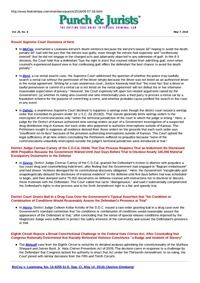Loaded on
May 7, 2018
published in Punch and Jurists
May 07, 2018
A jury convicted Randy Joe Metcalf of committing a hate crime in violation of the Matthew Shepard and James Byrd, Jr., Hate Crimes Prevention Act of 2009, 18 U.S.C. § 249(a)(1) (the “Act”); and he was sentenced to the statutory maximum of 120 months in prison. On appeal, Metcalf …
Loaded on
May 7, 2018
published in Punch and Jurists
May 07, 2018
Here the Court granted bail in a drug case after concluding that the series of special release conditions imposed by the Magistrate Judge were sufficient to protect the safety interests of the community and assure the Defendant’s presence at trial.
Proving that it can be done, Judge Coleen …
Loaded on
May 7, 2018
published in Punch and Jurists
May 07, 2018
In this case, the Supreme Court ruled that drivers of rental cars do not lose their constitutional right to privacy solely because they are not listed on the rental agreement. Writing for a unanimous court, Justice Kennedy held: “The mere fact that a driver in lawful possession or control …
Loaded on
May 7, 2018
published in Punch and Jurists
May 07, 2018
The issue before the Court in this case was whether it is unconstitutional to allow defense counsel to concede guilt over the defendant’s “intransigent” and “unambiguous” objection. And, in this 6-3 decision, the majority held that a lawyer for a criminal defendant cannot override his client’s wish to maintain …
Loaded on
May 7, 2018
published in Punch and Jurists
May 07, 2018
Here a unanimous Court declined to suppress a wiretap even though the district court issued a wiretap order that exceeded its powers under 18 U.S.C. § 2518(3) because none of the communications unlawfully intercepted were introduced at trial.
Under Federal law, a judge normally may issue a wiretap …
Loaded on
May 7, 2018
published in Punch and Jurists
May 07, 2018
Judge Carney’s opening words in this blunt and sometimes hard-to-believe decision underscore his patent anger at the “Government’s misconduct and [its] unwillingness to take responsibility for its actions”:
“Due process demands that the Government disclose to a defendant all material evidence in its possession that is favorable to the …
